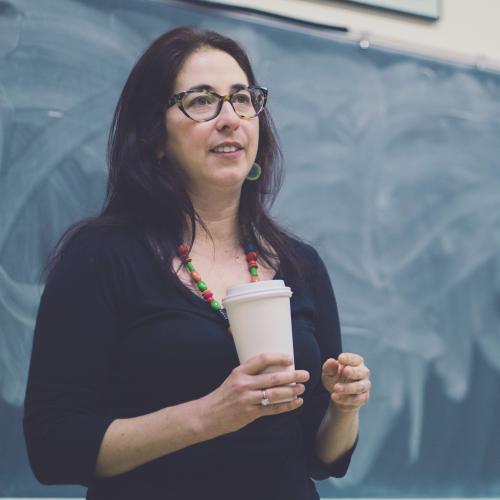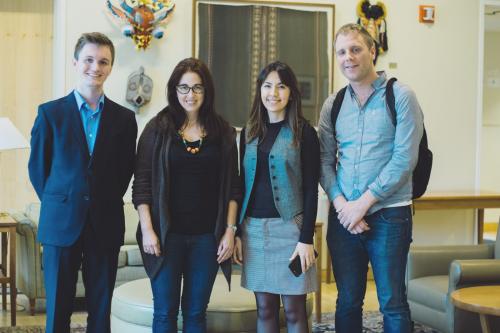
On February 16, Marci Shore, professor of cultural and intellectual history at Yale University spoke in conversation with the New Haven community about her most recent book The Ukrainian Night: An Intimate History of Revolution. The event was sponsored by the European Studies Council at the Macmillan Center. Unlike the many existing accounts that present the Maidan Revolution as an episode of geopolitical struggle, professor Shore’s book shows us revolution as lived experience, experience given to pure subjectivity. These are the stories of the young adults and their parents, students and professors, writers and artists, who lived in the wake and through the Maidan Revolution, during those critical winter months of 2013-2014.
Sharing with us how she came to write this book, professor Shore said that she saw what happened during the Maidan as a return of metaphysics to Eastern Europe, which had been replaced by pragmatics soon after 1989. Now, the line was crossed “from something that was potentially a political transformation to something that was an existential transformation — the actual human souls were being transformed before our eyes.”
One of the things that had long interested professor Shore is the generational identity — i.e. the generational conflict and generational rebellion. She says that to some extent the entire history of communism could be seen as a kind of Freudian family romance, in which each generation in its turn rises up to kill the fathers and rebel against the senses of the parents. However, what happened at the Maidan was extraordinary. Instead of pulling their protesting children off the streets when Yanukovych sent the riot police, the parents joined the protests; one of the stories Professor Shore tells in her book is a story of Taras Prochasko, a father who joined his 23-year-old son Markiyan in the protests. This is how the phrase ‘will not permit to beat our children’ became the slogan of the Revolution.
What happened afterwards was that the Maidan turns from a protest movement into a multigenerational parallel polis, a whole parallel society with the extremely elaborate infrastructure and a masterful self-organization. The protesters set up huge communal kitchens, open university, film screenings in libraries, and clean-up teams. Indeed, professor Shore says, “it was some kind of explosion of civil society that people did not even suspect that they necessarily possessed.”
Professor Shore with graduate students
To some extent, some of the explorations in this book came from linguistic observations, which, as professor Shore believes, she was able to make as a non-native speaker. She explains that being a non-native speaker is almost like being in a state of ostranenie. She thinks that in some sense as a non-native speaker, certain phrases that people used in their conversations jumped out at her, in a way that they might not to in English. Among these were different accounts of moments of decision-making, which were coming up again and again; it was this existential moment, which Jean-Paul Sartre had in mind when he said that we are nothing until we make a choice.
Professor Shore pointed out that many reviewers were disappointed that she does not talk about what Putin and Yanukovych are thinking and that she does not tell them how to fix problems in Ukraine. But as she already mentioned, her intention was not to write a political analysis of the Maidan Revolution. In the words of Professor Shore, “to a large extent, the book is about some kind of existential dynamics in revolution.” It is about revolution as lived experience, about revolution as experience given to pure subjectivity, given to the individual.
One of questions in the extensive Q&A session that followed the talk was about the origin of the book title, The Ukrainian Night. Shore replied that it was not only inspired by the poem of the Russian poet and playwright Vladimir Mayakovsky, “Debt to Ukraine;” but indeed it was a double reference because the idea to adopt these words as a title of the book came to her when she saw the scene in the documentary Babylon 13, in which a Ukrainian guy in the camo uniform recited by heart in his beautiful Russian language this very poem of Mayakovsky.
Written by Kamila Orlova, a graduate student of the European & Russian Studies Masters program


